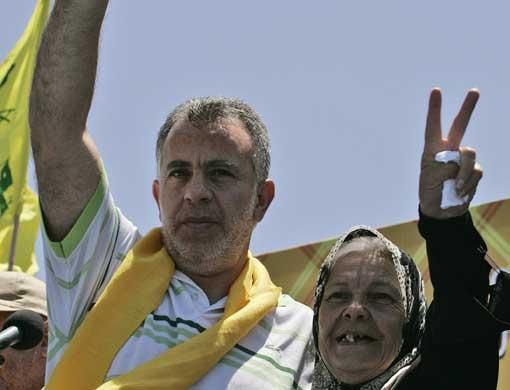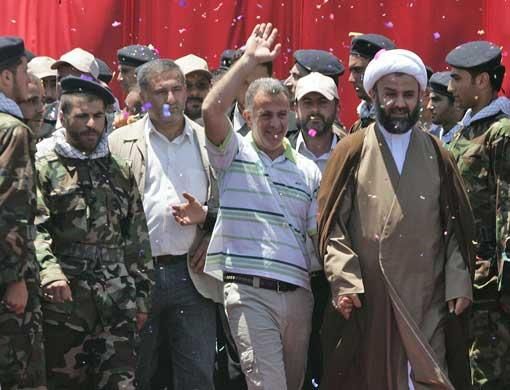Dubai: In a timed move, a coffin containing the remains of an unspecified number of Israeli soldiers who were left behind after the July 2006 war on Lebanon were swapped with the convicted Hezbollah spy in Israel, Nassim Nisr.
The swap was conducted at Naqoura border crossing in southern Lebanon.
Israel said the Hezbollah move to release the remains of what is suspected to be army soldiers is not linked with the handing over of Nisr to Lebanon, but a senior official from Hezbollah told Gulf News in a telephone interview that the swap crowned months of negotiation through German mediators.
Dr Hussain Rahal, head of media relations at Hezbollah, said the negotiation with the Israelis is still on for further swaps of prisoners of war.
An official from Hezbollah, who spoke on condition of anonymity, told Gulf News that Israel was not willing to publicly link the release of Nisr and the handing over of the remains of soldiers to control criticism by the Israeli public over swapping Arab prisoners with the remains of dead soldiers.
Rahal told Gulf News: "Anybody could judge by himself if the timed swap operation was linked or not. I have no right to reveal negotiation secrets because we are still talking through German mediators to secure the release of other Lebanese prisoners in Israel."
He said Hezbollah is not going to reveal the number of soldiers whose remains were handed over to Israel yesterday and that the party has more to bargain for the release of Lebanese prisoners of war in Israeli prisons.
Yesterday's move raised hope about the release of Lebanese prisoners from Israel. The party officially announced that it will not return the two Israeli soldiers captured by the party on the eve of the July 2006 war against Lebanon unless the longest-serving Arab prisoner in Israel, Samir Qantar, is released along with other Lebanese prisoners in Israel. Qantar is serving a life term for killing an Israeli family in a northern Israeli colony. He has been in jail for the past 29 years.
Last week, Israel said it was ready to release five Lebanese prisoners and return the bodies of 10 Hezbollah fighters in exchange for the two soldiers, Eldad Regev and Ehud Goldwasser, whose capture in ambush near the Lebanese border sparked the July 2006 Israeli war.
The largest exchange of prisoners between Hezbollah and Israel was finalised in January 2004 when 400 Palestinians and 31 Arabs from different nationalities, including 23 Lebanese, were released in exchange for an Israeli reservist and businessman, Elhanan Tennenbaum, and the remains of other three Israeli soldiers.
Mohammad, Nassim's brother, told reporters Israel put pressure on Nassim to abandon plans to return to Lebanon with his daughter leaving his Israeli wife behind.
Key facts: Charged with spying
- Nassim Nisr, 40 years old and a father of three, born to a Shiite father and a Jewish mother.
- Valentina Nisr, Nassim's mother, converted to Islam.
- She migrated with Nassim, then 24, to Israel under the Law of Return, which allows any Jewish man or woman to return.
- The mother and her son maintained that they migrated to Israel to improve their quality of life and had nothing to do with sentiments against Zionism.
- Nassim enjoyed the rights of full Israeli citizenship since he was considered a Jew under Judaism, which considers every man or woman born to a Jewish mother as a Jew regardless of their father's faith.
- The spying case found Nassim guilty of passing information to a senior Hezbollah officer, as well as photos of one of his relatives who was a high-ranking Israeli security official.
- Nassim took photos and gathered intelligence on potential gas and electrical facilities to be used as targets by Hezbollah. He said he did so under his own initiative without being asked to do so.
- He told the court that Hezbollah asked him to establish contact with high-ranking military officers to solicit intelligence and to try and gauge public sentiment in Israel after Hezbollah attacks on Israel.
- He told the court he was proud of the charges because he saw himself "as a Lebanese patriot and as a Muslim".
- Earlier this year, Nassim completed his six-year sentence, but was kept in "administrative detention" to be used as a bargaining chip in Israel's negotiations with Hezbollah to secure the release of two Israeli soldiers, Eldad Regev and Ehud Goldwasser, who were captured by the group on the eve of July 2006 war on Lebanon.














